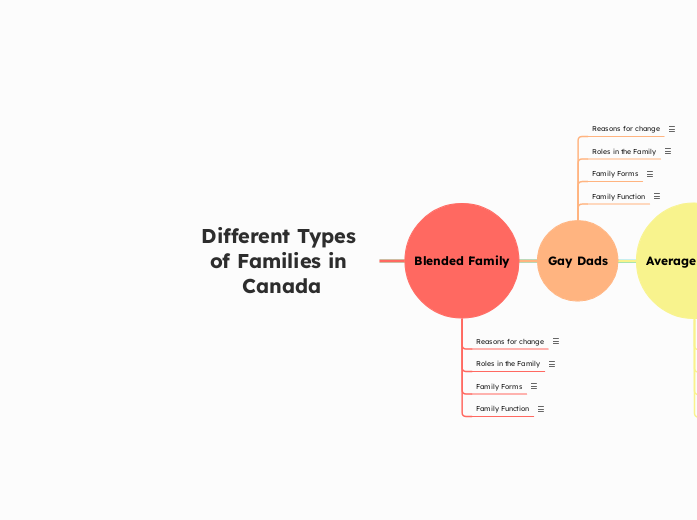Different Types of Families in Canada
My Family
My family fosters emotional and financial support. They also ensure that I am able to gain/improve my education to ensure that I am independently capable of taking care of myself as I grow older. Furthermore, I am required to take care of myself, such as folding my clothes, washing my own dishes, and ensuring that I make my own food for myself. This allows me to be more active and also improve my basic needs as an individual.
My family is a nuclear family which consists of 2 parents, and 2 siblings, and 2 grandparents who are temporarily visitng my residence. This is an ideal nuclear family.
Dad: My father is the breadwinner in the family and ensures the household is financially responsible. He does most of the labour work at home.
Mom: My mother also works, making my family a "nuclear" family. She takes care of everybody and ensures a meal is prepared for everybody.
Me: I am required to go to school and do well. This will ensure I get into a good university to seek a good job. I also assist my father in his personal endeavor such as his MBA projects he does for his university. I also assist with labor related tasks alongiside my father.
There are multiple ways that my family may change. My great grandmother passed away a year ago. This led my father and grandfather to stay in India for 3-6 months, leaving my family to be single-parent family during the time. While my dad eventually returned, I understood the struggle of raising an entire family without another parent. I was required to complete all normal labour tasks individually and ensure that I handeled some of the chores to reduce the burden on my mother.
Extended Family
Extended families provide strong emotional and financial support. They also ensure that the children are aware of the cultural norms and traditions that the family members have been taught through childhood. In esscence, an extended family ensures that the children are well protected and cared.
This type of family consists of multiple generations living all together. This includes grandparents, uncles, aunts, and even older siblings.
Grandparents, aunts, uncles, and other relatives may help with raising children. Households chores and financial situations are also covered by the extended family members.
1) Financially Instable: In most cases, couples end up splitting due to the current economic scenario that has occured since the pandemic. With this, it is more accomodable to live alone as opposed to living with another individual
2) Abusive Parents: In some unfortunate cases, children can indeed be abused by their own family members. This prompts other blood related members to take care of the children. In most cases the grandparents or relatives take care of the children.
Single Parent
With a single parent, this family type focuses on providing , stability, and support for a child’s basic needs. While it may not be the "best" lifestyle, it is certainly maintainable and can indeed be enjoyed.
A single-parent family consists of one parent raising one or more children independently.
In a single-parent family, the individual takes on multiple roles, including financially supporting the family, becoming a caregiver, and be a good emotional support. Given the burden of the work on the individual, they may require the children to complete some labour related tasks.
1) Financially Instable: In most cases, couples end up splitting due to the current economic scenario that has occured since the pandemic. With this, it is more accomodable to live alone as opposed to living with another individual
2) Health Risks: In some unfortunate cases, one of the family members may become terminally ill or require medical attention. For this reason, families may end up splitting apart.
Average Family
The main purpose of an average family is to maintain a stable home, nuture and provide education to children, and make investments that ensure good benefits for both the parents and children.
This family normally consists of two parents (typically a male and female), and normally 1-3 children. This is considered an ideal "nuclear" family.
In an average family, parents are typically responsible for financial stability, taking care of children, and providing emotional support. In most cases there is a breadwinner present in an average family. Children are taught to socialize and develop their education at school.
There are a multitude of factors that can change within an "Average Family".
1) Life Stages: As children grow up and continue to grow as people, families have to adjust their expectation and manners for one another. This change in behavior allows the children to become more independent and seek change.
2) Health Issues: Over time, family members may be affected through mental of physical health changes. This can shift the family to adjust for taking care of the individual.
Gay Dads
This family structure shows how individuals can still create a nurturing, loving, and supportive environment while not following traditional family roles. This also allows the children to become more LGBTQ+ aware.
A Gay Dad family includes two gay dads thatraise children together, either through adoption, or biological children from past relationships.
Both fathers can share parenting duties equally, such as childcare, completing household tasks, and financial support. They can also share their responsibilities and committments amongst one another to remove the burden of adulthood.
As society begins to accept LGBTQ+ rights, gay dads may begin to see changes in how they interact with the community. With legal changes such as marriage equality and more adoption rights for LGBTQ+ individuals, gay dads are able to feel a sense of belonging in their local communities
Blended Family
Family Function
Blended families provide strong, emotional and financial support. They preserve their old traditions, and ensure that the responsibilities are shared among their children. They aim to improve their child's lifestyle by remaking the family.
Family Forms
A blended family can consist of multiple generations living under one roof, often including grandparents, parents, and children together from both sides of the family.
Roles in the Family
Grandparents, aunts, uncles, and other family members from both sides of the family may complete housework tasks, and make specific financial contributions. Children are required to be obedient to their elders.
Reasons for change
There are a multitude of factors which can lead a family to become a "blended family".
1) Parenting Differences: Parents and Stepparents may face challaneges in maintaining a good relationship with their stepchildren, especially when the biological parent does not approve of the handling of the step parent.
2) Emotional Challenges: Children may still feel emotions of loss given the detachment between their biological parents. This may lead to children having a altered opinion of the stepparent.
3) Environment: In certain cases, children are required to move into their stepparents' house. This may lead them feeling hostile with their stepparents and stepsiblings.









